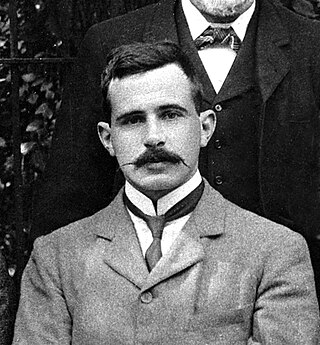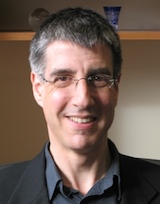Related Research Articles

Conrad Hal Waddington was a British developmental biologist, paleontologist, geneticist, embryologist and philosopher who laid the foundations for systems biology, epigenetics, and evolutionary developmental biology.

Lewis Wolpert was a South African-born British developmental biologist, author, and broadcaster. Wolpert popularized his French flag model of embryonic development, using the colours of the French flag as a visual aid to explain how embryonic cells interpret genetic code for expressing characteristics of living organisms and explaining how signalling between cells early in morphogenesis could inform cells with the same genetic regulatory network of their position and role.

In developmental biology, an embryo is divided into two hemispheres: the animal pole and the vegetal pole within a blastula. The animal pole consists of small cells that divide rapidly, in contrast with the vegetal pole below it. In some cases, the animal pole is thought to differentiate into the later embryo itself, forming the three primary germ layers and participating in gastrulation.

Nicole Marthe Le Douarin is a developmental biologist known for her studies of chimeras, which have led to critical insights regarding higher animal nervous and immune systems.
Viktor Hamburger was a German-American professor and embryologist. His collaboration with neuroscientist Rita Levi-Montalcini resulted in the discovery of nerve growth factor. In 1951 he and Howard Hamilton published a standardized stage series to describe chicken embryo development, now called the Hamburger-Hamilton stages. He was considered "one of the most influential neuroembryologists of the twentieth century".
Cheryll Anne Tickle is a British scientist, known for her work in developmental biology and specifically for her research into the process by which vertebrate limbs develop ab ovo. She is an emeritus professor at the University of Bath.
William Anthony Harris FRS FMedSci is a Canadian-born neuroscientist, Professor of Anatomy at Cambridge University, and fellow of Clare College, Cambridge. He was head of the Department of Physiology, Development and Neuroscience since its formation in 2006 until his retirement in 2018.

John Wilfred Jenkinson (1871–1915) was a pioneer in the field of comparative developmental biology and one of the first to introduce experimental embryology to the UK at the start of the 20th century. He originally studied Classics as an undergraduate student at Oxford, before switching his attention to Zoology under the guidance of W. F. R. Weldon at University College London. He also travelled to Utrecht University in the Netherlands, to work with Ambrosius Hubrecht, and was exposed to new methods and approaches in embryology. In 1905, he was appointed the first lecturer in Embryology at the University of Oxford in England, and in 1909 published the first English textbook on experimental embryology in which he summarized recent work in the emerging scientific discipline and criticized neo-vitalist theories of Hans Driesch.

Enrico Sandro Coen is a British biologist who studies the mechanisms used by plants to create complex and varied flower structures. Coen's research has aimed to define the developmental rules that govern flower and leaf growth at both the cellular level and throughout the whole plant to better understand evolution. He has combined molecular, genetic and imaging studies with population and ecological models and computational analysis to understand flower development.
Philip William Ingham FRS, FMedSci, Hon. FRCP is a British geneticist, currently the Toh Kian Chui Distinguished Professor at the Lee Kong Chian School of Medicine, a partnership between Nanyang Technological University, Singapore and Imperial College, London. Previously, he was the inaugural Director of the Living Systems Institute at the University of Exeter, UK and prior to that was Vice Dean, Research at the Lee Kong Chian School of Medicine.
The International Society of Developmental Biologists (ISDB), formerly the Institut Internationale d'Embryologie (IIE), is a non-profit scientific association promoting developmental biology. The society holds an international Congress every four years, and awards the most prestigious award in the field of developmental biology—the Ross Harrison Prize.

Rosa Susan Penelope Beddington FRS was a British biologist whose career had a major impact on developmental biology.

Daniel Mark Wolpert FRS FMedSci is a British medical doctor, neuroscientist and engineer, who has made important contributions in computational biology. He was Professor of Engineering at the University of Cambridge from 2005, and also became the Royal Society Noreen Murray Research Professorship in Neurobiology from 2013. He is now Professor of Neurobiology at Columbia University.

Elizabeth Jane Robertson is a British developmental biologist based at the Sir William Dunn School of Pathology, University of Oxford. She is Professor of Developmental Biology at Oxford and a Wellcome Trust Principal Research Fellow. She is best known for her pioneering work in developmental genetics, showing that genetic mutations could be introduced into the mouse germ line by using genetically altered embryonic stem cells. This discovery opened up a major field of experimentation for biologists and clinicians.

Sarah-Jayne Blakemore is Professor of Psychology and Cognitive Neuroscience at the University of Cambridge and co-director of the Wellcome Trust PhD Programme Neuroscience at University College London.

Julian Hart Lewis FRS was an English developmental biologist and researcher whose work shed light on the nature of cellular timing mechanisms and their role in animal development. He showed that the Notch ligand controls the timing of nerve cell differentiation and the synchronised cycling of neighbouring cell activity. He modelled the cellular oscillatory circuit that determines the segmentation of the developing body, and clarified the importance of delay kinetics in setting the frequency of those oscillations.

Claudio Daniel Stern FRSB, FMedSci, FRS is a Uruguayan biologist currently working at University College London (UCL).

Sir James Cuthbert Smith is an Emeritus Scientist at the Francis Crick Institute, Honorary Fellow of Christ's College, Cambridge and President of the Council at the Zoological Society of London.

Adam Sebastian Genevieve Curtis was a British cell biologist who researched cell adhesion and contact inhibition. He worked at the University of Glasgow from 1967 until he became a professor emeritus in 2004. He was president of the Society for Experimental Biology from 1993 to 1995 and an elected fellow of the Royal Society of Edinburgh and Royal Society of Biology.
Christiana Ruhrberg is a German-British cell biologist who is Professor of Neuronal and Vascular Biology, University College London. She looks to understand how cells interact during the development and disease of mammals.
References
- ↑ "About us – join". British Society for Developmental Biology. Retrieved 1 May 2017.
- ↑ Slack, Jonathan M. W. (2003). "A short history of the British Society for Developmental Biology". International Journal of Developmental Biology. 44 (1): 79–83. PMID 10761851.
- 1 2 3 "Awards". British Society for Developmental Biology. Retrieved 1 May 2017.
- ↑ Post-award interview with Phil Ingham: http://thenode.biologists.com/an-interview-with-phil-ingham/interview/
- ↑ Video of Phil Ingham's award lecture: https://www.youtube.com/watch?v=tDMbm4ncrvc&list=UU9KrscRlutJCx2POToj-uLQ
- ↑ Post-award interview with Lewis Wolpert: http://dev.biologists.org/content/142/15/2547.full
- ↑ Video of Lewis Wolpert's award lecture: https://www.youtube.com/watch?v=3pAvvGo3np8
- ↑ Video of Enrico Coen's award lecture: https://www.youtube.com/watch?v=TsbpYDD_Hnw
- ↑ Blog post about Bill Harris' achievements: http://thenode.biologists.com/waddington2017/societies/
- ↑ Video of Bill Harris' award lecture: https://www.youtube.com/watch?v=iHJSYP6z6KE&t=443s